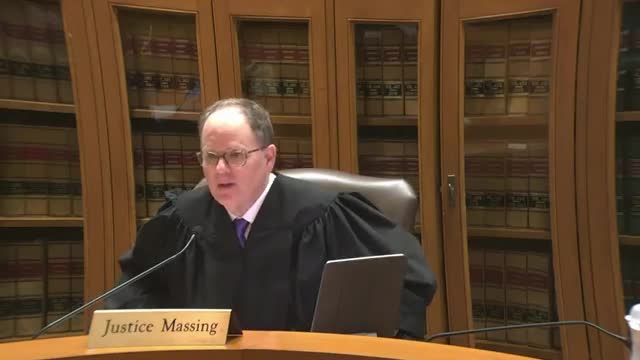Appeals court hears dispute over whether union benefit funds must use 65‑day bond-notice process
October 10, 2025 | Judicial - Appeals Court Oral Arguments, Judicial, Massachusetts
This article was created by AI summarizing key points discussed. AI makes mistakes, so for full details and context, please refer to the video of the full meeting. Please report any errors so we can fix them. Report an error »

The Massachusetts Appeals Court heard arguments Oct. 10 in New England Carpenters Central Collections Agency Trustee v. Arch Insurance Co. over whether trustees for union fringe-benefit funds were required to follow the public-construction bond notice and timing rules or could treat the general contractor as a direct contractual party.
Luke Liakos, representing the trustees and affiliated funds, said trustees routinely exhaust remedies against delinquent subcontractors and that, because the collective-bargaining agreement requires signatory employers to contribute to trust funds and obligates general contractors to assist collections, the trustees have a contractual relationship with the general contractor. Liakos said trustees often lack practical notice of a subcontractor’s last day on a job and that the statutory 65‑day timing rule presumes uncertainty in construction timing.
Mansoor Ahmed, arguing for Arch Insurance, urged the court to affirm summary judgment for Arch. He said G.L. c.149 §29 creates two distinct procedures: one for claimants with a contractual relationship to the contractor principal (a direct claim within one year) and a separate procedure, including a written notice within 65 days of last providing labor or materials, for claimants whose contractual relationship runs through a subcontractor. Ahmed told the panel that the trustees’ rights arise as third‑party or incidental beneficiary rights of the collective-bargaining agreement and thus fall within the 65‑day/one‑year notice procedure.
Justices pressed both sides on how trustees obtain notice of the last day of work, on the statutory policy behind the 65‑day window, and on how collective-bargaining obligations—such as two‑party checks and contractual duties of assistance—should be classified for purposes of §29. Counsel cited cases the briefs relied on, including Barbosa and Peters, and the parties debated whether the bond statute should be read to require strict notice compliance for trustees even when trustees are signaled in the collective-bargaining agreement.
The panel also discussed the mechanics-lien statutes and whether those provisions shed light on which procedural route trustees must take. Arch emphasized the importance of the 65‑day mechanism as protecting general contractors from double payment and preserving a predictable claim process for sureties. The trustees’ lawyer said trustees are expressly contemplated in the statute’s opening paragraph and that the statutory term “contractual relationship” should be given its common-law meaning in context.
The court took the case under advisement after argument; no opinion was issued from the bench.
Luke Liakos, representing the trustees and affiliated funds, said trustees routinely exhaust remedies against delinquent subcontractors and that, because the collective-bargaining agreement requires signatory employers to contribute to trust funds and obligates general contractors to assist collections, the trustees have a contractual relationship with the general contractor. Liakos said trustees often lack practical notice of a subcontractor’s last day on a job and that the statutory 65‑day timing rule presumes uncertainty in construction timing.
Mansoor Ahmed, arguing for Arch Insurance, urged the court to affirm summary judgment for Arch. He said G.L. c.149 §29 creates two distinct procedures: one for claimants with a contractual relationship to the contractor principal (a direct claim within one year) and a separate procedure, including a written notice within 65 days of last providing labor or materials, for claimants whose contractual relationship runs through a subcontractor. Ahmed told the panel that the trustees’ rights arise as third‑party or incidental beneficiary rights of the collective-bargaining agreement and thus fall within the 65‑day/one‑year notice procedure.
Justices pressed both sides on how trustees obtain notice of the last day of work, on the statutory policy behind the 65‑day window, and on how collective-bargaining obligations—such as two‑party checks and contractual duties of assistance—should be classified for purposes of §29. Counsel cited cases the briefs relied on, including Barbosa and Peters, and the parties debated whether the bond statute should be read to require strict notice compliance for trustees even when trustees are signaled in the collective-bargaining agreement.
The panel also discussed the mechanics-lien statutes and whether those provisions shed light on which procedural route trustees must take. Arch emphasized the importance of the 65‑day mechanism as protecting general contractors from double payment and preserving a predictable claim process for sureties. The trustees’ lawyer said trustees are expressly contemplated in the statute’s opening paragraph and that the statutory term “contractual relationship” should be given its common-law meaning in context.
The court took the case under advisement after argument; no opinion was issued from the bench.
View full meeting
This article is based on a recent meeting—watch the full video and explore the complete transcript for deeper insights into the discussion.
View full meeting
